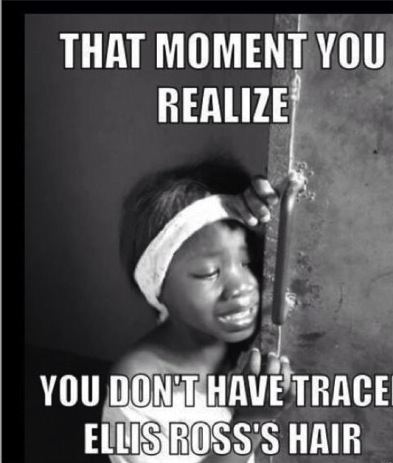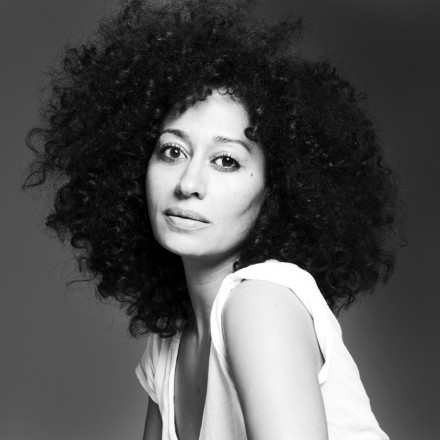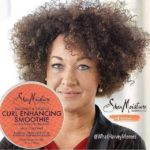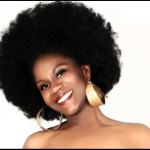We’ve all seen this image circulating on natural hair group facebook pages, instagram accounts and twitter:
And if you’re like me – one of your first reactions was probably to laugh. To the point of howling. But I have to admit that after I laughed I felt…off. I’ve debated with whether or not to forward or “like” the image.
After all – who doesn’t like a good “natural hair” joke?
But I’ve always decided to keep my laughter at this image personal, quite and only behind my own doors. Why? Because despite the fact that it’s hilarious at first glance, the message it sends is one of the most potentially harmful circulating within the Black community.
The message conveyed by this picture, which features a brown skinned Black girl crying for hair like the lovely Tracee Ellis Ross, is at the heart of many of the issues that prevent Black women from loving the hair they have.
We all know there is a hair type and skin color hierarchy in the Black community. And we’d be lying if we didn’t recognize that instead of transcending this hierarchy in the natural hair movement – many naturals have unconsciously adopted, embraced and even perpetuated this way of thinking.
A Certain “Type” of Natural
Many of us want natural hair – but only if it looks like Sister Tracee’s.
Many of us with kinky hair spend hours of our lives searching for youtube videos of women with looser, “definable” curls and yearn for the day we find a product that will make our nappy hair look more like mixed girl hair.
There is, after all, a reason that some of the highest rated youtube natural hair videos feature multi racial women with hair that could never be described as anything close to kinky or nappy.
There are reasons why natural hair stylists bemoan the fact that many natural heads come to the salon looking for miracles that will transform their kinky, nappy strands into hair that is…neither kinky nor nappy.
We may want to be natural. But some of us only want a certain “type” of natural. This desire was at the heart of my youthful run ins with the Jheri Curl. Le Sigh!
As I’ve noted before:
A lot of girls who grew up believing that they had “bad” hair (or a very tight, coily or kinky curl pattern) spent their early years longing for “good” hair (or hair closer to the texture of Europeans) that could blow in the wind… Many of us grow up wishing we had lighter brown skin – often times regardless of how light or dark brown our actual skin color already was.
I’m as guilty of this as anyone. As I describe in my book,
I have vivid memories of coming home from church on Sundays and my sister and I would put our crinoline slips or stockings on our heads. We tied them on with belts or string so that the soft material could brush against our shoulders the way we imagined straight long hair did. I wanted hair like the White girls had—but I would have settled for hair like my sister’s. Naturally, my sister was also impacted by these messages and despite the fact that relatively speaking, she already had “good” hair, in our childhood games she wanted hers to be straighter too.
We Have the Power to Change This
This is not about pointing fingers. It’s about recognizing that until we change the thoughts that are in our heads it will be very challenging to embrace the hair that is on our heads. It will be difficult to convince our children that they should love the skin they are in and the hair that they wear if so many of us are secretly nursing the desire for hair closer to the kind of hair that grows from our White sisters’ heads.
That’s why I was elated to see this video response to the image from Tracee Ellis Ross where she calls for a “hair love” campaign. Ms. Ross saw this picture and like many of us she laughed and felt flattered—at first.
But as she noted in her video:
At the same time I don’t want you to want my hair…and the reason I don’t want you to want my hair is I’m of the school of love what you got…For me, the reason my hair was such a battle is because I was trying to make it something it wasn’t. I wanted the hair that somebody else had. And because of that I was damaging my hair, trying to beat it into submission, trying to make it something it wasn’t, trying to make it slip into my face unconsciously. I was trying to do all of those things to it and as a result I was ruining and damaging the hair that I was given.
Can the church say “Amen”?
Ms. Ross ends her video by calling for participants in a Hair Love campaign (details on how you can participate below).
See it doesn’t matter how straight, “good” or “mixed” your hair may look. If you are a woman (or man) of African descent you are being targeted with messages that tell us we will never be good enough until we look whiter or have straighter hair. Many of us harbor a little Black girl inside who still fails the doll test. Many of us still buy into a default pattern of thinking that strives to be “just as good as” our White brothers and sisters.
And if you are a Black woman (or man) who wants something better for our kids than what we had then you owe it to yourself, your sisters, your mothers, your aunties, your grandmas, your children, nieces, nephews, husbands, uncles, grandpas and everyone else in your family and community to challenge these beliefs whenever they rear their ugly heads.
So consider this my endorsement of Tracee Ellis Ross’ Hair Love campaign. PLEASE PARTICIPATE!!! All you have to do is go to youtube and upload a video that describes your hair in 5 words or less, and explain why you love it.
It’s that easy. Sometimes we make things more complicated than they have to be. Imagine the love little Black girls and boys may feel when there are thousands of videos on the net describing how awesome Black hair is?
I’ll be discussing this issue more in depth at my book release event on June 30, 2013 (click here for details). Hair and color are so intertwined in our collective experience that I’m looking forward to sharing excerpts of my book that directly address these topics. I hope you can join us!
Here’s the video. Thank you Tracee!






Well said Lurie!
Wow this is so insightful! I noticed too that the top ranked videos on YouTube and the photos on Instagram with the most likes are usually the natural hair styles that are neither nappy nor kinky – they still look fly though but I definitely think we have become conditioned to like the looser curl type natural hair styles and aspire to recreate them. Kudos to Tracee for encouraging people to love whatever strands are on their head!
Wow, I’ve thought this so many times, but was reluctant to state so in fears of being apart of a natural sisters divide. Natural is natural, right? But there is still a natural that is easier and more acceptable to be.
Totally know what you mean there. I think at first a lot of ladies want that type of hair and spend tons of time research trying to get those loose kinky curls. At first for some that are new to it natural hair can be frustrating. So people go to these youtube channels where you see females with a smoother grade of hair showing you how to deal with nappy knotted hair and try for styles that don’t work for their hair type and end up with even more frustration. It used to bother me that my natural hair didn’t look exactly how I expected it to. A lot of me getting to love my hair was figuring out how to manage it. Through trial and error I figured out what worked for me and my hair type and in the end I found styles I could do and be happy with. Also I can feel more comfortable with rockin a fro because the condition of my hair has gotten better.
Another thing is that its not just the black sister out there who has problems with having there hair natural. From when I was younger up to now I’ve had pretty diverse groups of friends. The Italian girls want strait silky flat hair instead of the bouncy curls I would have died for back then. The Korean and Chinese girls wanted napps and curls because they wanted more textured hair. The white girls with strait hair wanted waves or loose curls. I guess for us gals and our hair the grass is always greener.
Hey Lurie,
This is another incredible piece! Could I re-post this one also on BGLH?
Leila
Absolutely!
Well said! Kudos to Tracee for sending a postive message about self acceptance.
Thank you and agreed! I love it when positive people can get their message out there!
This is so true, your article remind me of myself few months back, I was that girl who spent most of her time on YouTube to figure out how to make her hair look more like a mixed race girl, what the “right product” to make my kinky hair curly? I was so frustrated spending a long time in front of the mirror putting Eco styler hair gel on my hair as I’ve got a big afro hair, not only that, the worst thing was I used to get sick, physically sick with flu as the hair would not dry and I live here in the UK. Basically thought I had natural hair I was torturing myself to make my hair like somebody else, until I asked myself this question, Why did I go natural?
Natural hair is about accepting who you are naturally, the acceptance of my natural kinks, the way it is on my head and not on somebody’s else, that’s when everything change, now I wear my big afro outside, use only natural hair products, which is from my kitchen like honey, avocado, extra virgin Olive oil etc. what I want is to moisturise and manage my natural hair which is on my head and not mimic somebody else. Thank you Lurie like you said having and wearing the afro, is a state of mind and it is very true, I am much happier now with my hair and glad that I came to this website.
It’s sad to see the self-hate still around with hair. Honestly, “natural” hair products often used mixed people and girls not actually black women with the very tightly coiled hair(4a-4c).
I saw this hair hierarchy years ago (back in the early days of YouTube et al) and remember mentioning this reflection of the hierarchical views showing in some of the online comments and even videos. I saw how the hair gurus on YouTube for example were (and still are largely) no ‘tighter’ than a 4b texture. Many vehemently deny what deep down is an inconvenient truth. We still have a long way to go.
I’d suggest that if we collectively want to really make a significant societal change we need to form pressure groups / be lobbyists / etc who campaign (on a large scale) to ensure the media (tv, magazines, literature, online, radio, etc) INCLUDE us…and not some token nod to the ‘black’ they find acceptable. I’ve seen it done for things as abstract as car adverts or general tv adverts in the UK, why oh why can’t it be done across the board. It’s not enough for us to just rally internal support amongst ourselves; we need to stand and be heard – Think of it in much the same way as women had to take action to challenge society’s norms and gain ground for equality, or the civil rights movement. Other groups have dislike the way they’ve been marginalised and taken consistent, diligent action..across the board and strategically. I believe – if we truly want to put in the work, that the same type of mindset, strategy and powerful persistence (with conviction) will turn the tide significantly for us too.
The funny thing is, people think it’s okay to ridicule a white person with an Afro because hey, it’s not racist, they’re white. But another way of looking at it is, they’re singling out the one part of the person that isn’t stereotypically Caucasian, and that’s the part they don’t like. So without realizing it, they’re revealing their prejudice against that part of the person. In this country we’re brainwashed to believe that African hair in its natural state is unattractive, which is utterly absurd. Only brainwashing can explain why anyone would think limp, lank, sad, stringy, straight hair is preferable to glorious thick fluffy curls.